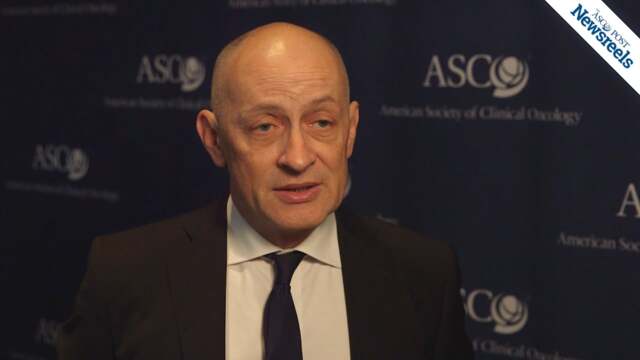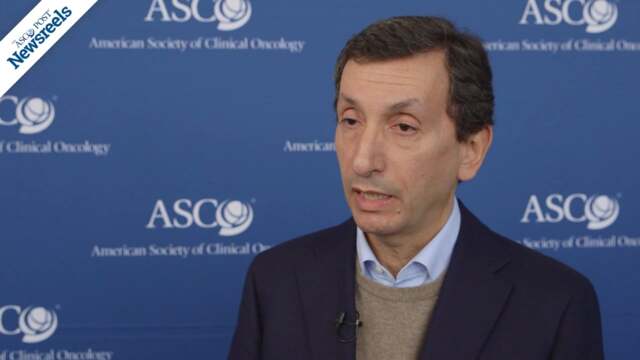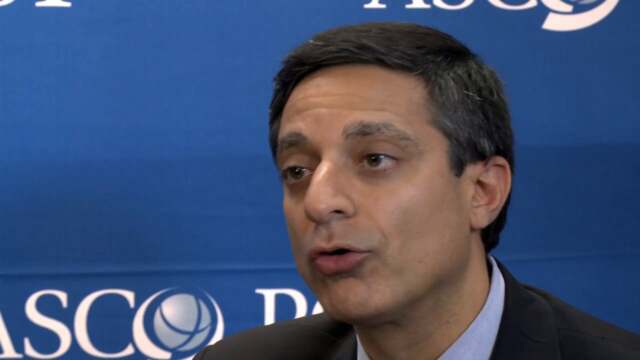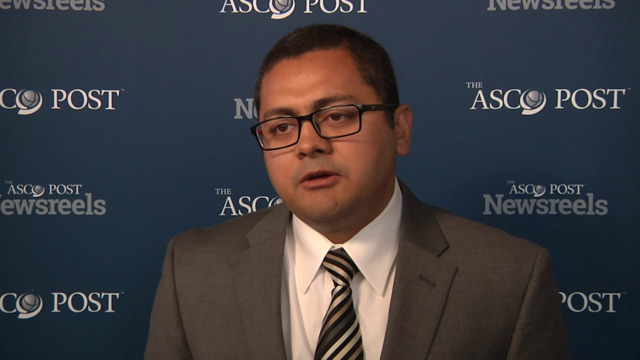Obesity Linked to Increased Risk of Multiple Myeloma Mortality in African Americans
Obesity may be associated with an increased risk for death from multiple myeloma in African Americans, according to a study reported by Sonderman et al in the Journal of the National Cancer Institute. Multiple myeloma incidence and mortality rates have been reported to be twice as high among...
Updated Outcomes and Impact of Age in FIRST Trial in Multiple Myeloma
As reported by Hulin et al in the Journal of Clinical Oncology, the updated findings in the phase III FIRST trial continue to show improved progression-free and overall survival with continuous lenalidomide (Revlimid) plus low-dose dexamethasone (Rd) vs melphalan, prednisone, and thalidomide (MPT)...
Ixazomib: A Relevant Addition to Myeloma Therapy
In 2015, four new drugs were approved for the treatment of multiple myeloma by the U.S. Food and Drug Administration: panobinostat (Farydak), daratumumab (Darzalex), elotuzumab (Empliciti), and ixazomib (Ninlaro). Of them, the first three are drugs with unique new targets, whereas ixazomib is the...
Addition of Ixazomib to Lenalidomide/Dexamethasone Improves Progression-Free Survival in Relapsed/Refractory Multiple Myeloma
In the phase III TOURMALINE-MM-1 trial reported in The New England Journal of Medicine, Philippe Moreau, MD, of the University Hospital Hôtel Dieu, Nantes, France, and colleagues found that adding the oral proteasome inhibitor ixazomib (Ninlaro) to lenalidomide (Revlimid) and dexamethasone...
SIRIUS Trial Heralds a New Era of Promise in Treating Resistant Myeloma
Multiple myeloma cells uniformly overexpress CD38.1 Daratumumab (Darzalex), a CD38-targeting human IgG1 kappa monoclonal antibody, has been evaluated in a series of phase I/II trials involving patients with relapsed or relapsed and refractory myeloma who have received at least two or more prior...
Daratumumab Shows High Activity in Heavily Pretreated and Refractory Multiple Myeloma
In the phase II SIRIUS trial reported in The Lancet, Sagar Lonial, MD, of Winship Cancer Institute, Emory University, and colleagues found that the CD38-targeted monoclonal antibody daratumumab (Darzalex) produced durable responses in patients with multiple myeloma who had received at least three ...
Sagar Lonial, MD, and Paul G. Richardson, MD, on Multiple Myeloma: Expert Perspectives on Treatment Advances
Sagar Lonial, MD, of Emory University School of Medicine, and Paul G. Richardson, MD, of the Dana-Farber Cancer Institute, discuss the top presentations on multiple myeloma delivered at this year’s meeting.
The ENDEAVOR Trial: A Case Study in the Interpretation of Modern Cancer Trials
It can be easy to miss the forest for the trees in the interpretation of clinical trials. In particular, trials for the treatment of cancer are exceedingly complex, with long lists of inclusion and exclusion criteria, designs with hidden biases, drugs with unpronounceable names (if not cumbersome...
Daratumumab Hits the Mark in Early Relapsed Multiple Myeloma
For relapsed or refractory multiple myeloma, daratumumab (Darzalex), combined with bortezomib (Velcade) and dexamethasone, reduced relapses by 61% in the phase III CASTOR study reported at the 2016 ASCO Annual Meeting.1 “The results are unprecedented in a randomized study comparing a novel...
Antonio Palumbo, MD, on Multiple Myeloma: Results From the CASTOR Trial
Antonio Palumbo, MD, of the University of Torino, discusses this phase III study of daratumumab, bortezomib, and dexamethasone versus bortezomib and dexamethasone in patients with relapsed or refractory multiple myeloma (Abstract LBA4).
Antonio Palumbo, MD, on Multiple Myeloma: Results From the CASTOR Trial (Italian Language Version)
Antonio Palumbo, MD, of the University of Torino, discusses in Italian this phase III study of daratumumab, bortezomib, and dexamethasone versus bortezomib and dexamethasone in patients with relapsed or refractory multiple myeloma (Abstract LBA4). To see the English language version of this video, please click here.
ASCO 2016: Adding Daratumumab to Bortezomib and Dexamethasone Markedly Improves Outcomes in Recurrent/Refractory Multiple Myeloma
Initial findings from a pivotal phase III trial showed that daratumumab (Darzalex) added to a standard two-drug regimen (bortezomib [Velcade] and dexamethasone) markedly improved outcomes for patients with recurrent or refractory multiple myeloma. The daratumumab combination reduced the risk of...
Michele Cavo, MD, on Multiple Myeloma: Results From a European Myeloma Network Trial (Italian Language Version)
Michele Cavo, MD, of the Seràgnoli Institute of Hematology, Bologna University School of Medicine, discusses in Italian results from this phase III study of upfront autologous stem cell transplantation vs novel agent-based therapy for multiple myeloma (Abstract 8000). To see the English language version of this video, please click here.
Michele Cavo, MD, on Multiple Myeloma: Results From a European Myeloma Network Trial
Michele Cavo, MD, of the Seràgnoli Institute of Hematology, Bologna University School of Medicine, discusses results from this phase III study of upfront autologous stem cell transplantation vs novel agent-based therapy for multiple myeloma (Abstract 8000). To see the Italian version of this interview, please click here.
ASCO 2016: Maintenance Lenalidomide After Autologous Stem Cell Transplantation Improves Survival in Multiple Myeloma
Several clinical trials have demonstrated that maintenance therapy with lenalidomide (Revlimid) after autologous hematopoietic stem cell transplant reduces the risk of disease progression in patients with multiple myeloma, but there have been no definitive results regarding overall...
NCCN Clinical Practice Guidelines in Oncology (NCCN Guidelines®): 2016 Guidelines
In 1996, the National Comprehensive Cancer Network (NCCN®) published its first set of Clinical Practice Guidelines in Oncology® (NCCN Guidelines®), covering eight tumor types. The NCCN Guidelines® are now published for more than 60 tumor types and topics. Some of the key updates for 2016 were...
Upfront Transplant Remains Standard of Care in Multiple Myeloma
Upfront autologous stem cell transplant remains the standard of care in patients with newly diagnosed multiple myeloma, even in the era of novel agents, according to a phase III study of the European Myeloma Network.1 “Our findings show that autologous stem cell transplant should remain the...
ASCO 2016: Autologous Stem Cell Transplant Remains Relevant in Multiple Myeloma, Even in Era of Novel Agents
Early findings from a phase III clinical trial (EMN02/HO95 MM) showed that patients with multiple myeloma who received an autologous stem cell transplant survived longer without disease progression than those who received only chemotherapy using novel agents. This is the largest study reported to...
Addition of Ixazomib to Lenalidomide/Dexamethasone Improves Progression-Free Survival in Relapsed/Refractory Multiple Myeloma
Moreau et al found that adding the oral proteasome inhibitor ixazomib (Ninlaro) to lenalidomide (Revlimid) and dexamethasone significantly prolonged progression-free survival among patients with relapsed, refractory, or relapsed and refractory multiple myeloma. They reported the findings from the...
Tight Junction Protein 1 May Identify Sensitivity to Proteasome Inhibitors in Patients With Multiple Myeloma
A gene known as TJP1 (tight junction protein 1) could help determine which multiple myeloma patients would best benefit from proteasome inhibitors such as bortezomib, as well as combination approaches to enhance proteasome inhibitor sensitivity, according to a study led by researchers from The...
Updates on Elotuzumab in Multiple Myeloma Show Persistence of Benefit
Studies presented at the 2015 ASH Annual Meeting bolstered support for elotuzumab (Empliciti) given in combination with lenalidomide (Revlimid) for the treatment of multiple myeloma. Elotuzumab is an immunostimulatory monoclonal antibody. It has a dual mechanism of action, directly activating...
Pembrolizumab Looks Promising in Multiple Myeloma
Monoclonal antibodies targeting the programmed cell death protein (PD-1) receptor look promising in multiple myeloma, according to early reports presented at the 2015 ASH Annual Meeting and Exposition. Early signs of activity in heavily pretreated patients may indicate that, as in solid tumors,...
Benefits and Risks of Transplantation: The Changing Therapeutic Paradigm for Multiple Myeloma
Although high-dose chemotherapy plus autologous transplantation has been a standard of care in the treatment of younger patients with newly diagnosed multiple myeloma, the advent of effective novel agents for the cancer over the past 15 years has raised the question of whether transplantation, with ...
Relatives of Patients With Carcinoma of Unknown Primary at Increased Risk for This and Other Cancers
Relatives of patients with carcinoma of unknown primary are at increased risk of developing it themselves as well as several other malignant neoplasms, including lung, pancreatic, and colon cancers; non-Hodgkin lymphoma; and myeloma, according to a study published in JAMA Oncology. “Some of...
International Myeloma Working Group Recommendations for Myeloma-Related Renal Impairment
International Myeloma Working Group recommendations for the diagnosis and management of myeloma-related renal impairment were recently reported by Dimopoulos et al in the Journal of Clinical Oncology. Recommendations were based on review of published data through December 2015. Key recommendations...
Kenneth Anderson, MD, on Multiple Myeloma Guideline Updates
Kenneth Anderson, MD, of Dana-Farber Cancer Institute, discusses how the many advances in the treatment of multiple myeloma affect current and future clinical practice.
Carfilzomib Plus Dexamethasone in Previously Treated Multiple Myeloma
In the Clinic provides overviews of novel oncology agents, addressing indications, mechanisms, administration recommendations, safety profiles, and other essential information needed for the appropriate clinical use of these drugs. On January 21, 2016, carfilzomib (Kyprolis) was approved for use in ...
CAR-T Cell Therapy May Have Role in Treating Multiple Myeloma
Among the burgeoning options for treating multiple myeloma could be an approach that is proving to be exciting in leukemia: CAR-T (chimeric antigen receptor T cells) therapy. Preliminary results of the first-in-humans study in myeloma were presented as a late-breaking abstract at the 2015 ASH...
Selected Abstracts From 2015 ASH Annual Meeting: Part 3
Here are several more abstracts selected from the proceedings of the 2015 American Society of Hematology (ASH) Annual Meeting and Exposition, focusing on newly diagnosed multiple myeloma, relapsed/refractory multiple myeloma, and amyloid light-chain (AL) amyloidosis. For other selected abstracts...
Studies Confirm and Extend the Benefits of Ixazomib in Multiple Myeloma
Patients with multiple myeloma now have access to an all-oral regimen, with the recent approval of the oral proteasome inhibitor ixazomib (Ninlaro) in previously treated patients. New pairings for the drug in relapsed/refractory and newly diagnosed patients are being studied, with investigators...
Sagar Lonial, MD, on the Phase III ASPIRE Trial
Sagar Lonial, MD, of Winship Cancer Institute, offers his thoughts on abstract 79, “Carfilzomib, Lenalidomide, and Dexamethasone vs Lenalidomide and Dexamethasone in Patients With Relapsed Multiple Myeloma: Interim Results From ASPIRE, a Randomized, Open-Label, Multicenter Phase III Study,” presented by A. Keith Stewart, MD.
Sagar Lonial, MD, on Monoclonal Antibodies in Multiple Myeloma
Sagar Lonial, MD, of Winship Cancer Institute, offers his thoughts on abstract 302, “Final Results for the 1703 Phase Ib/II Study of Elotuzumab in Combination With Lenalidomide and Dexamethasone in Patients With Relapsed/Refractory Multiple Myeloma,” presented by Paul G. Richardson, MD; abstract 84, “Safety and Efficacy of Daratumumab With Lenalidomide and Dexamethasone in Relapsed or Relapsed/ Refractory Multiple Myeloma,” presented by Torben Plesner, MD; and “A Phase Ib Dose Escalation Trial of SAR650984 (Anti–CD-38 mAb) in Combination With Lenalidomide and Dexamethasone in Relapsed/Refractory Multiple Myeloma,” presented by Thomas G. Martin III, MD.
Kenneth C. Anderson, MD, on Multiple Myeloma: Current Treatment Approaches and Future Directions
Kenneth C. Anderson, MD, of Dana-Farber/Brigham and Women’s Cancer Center, discusses the incredible progress made in treating multiple myeloma, with nine therapeutic options approved in the past decade, two drugs approved this year, and a number of new options on the horizon.
Sagar Lonial, MD, and James O. Armitage, MD, on Relapsed/Refractory Multiple Myeloma: The ELOQUENT-2 Trial and a Phase II Study of Daratumumab
James O. Armitage, MD, of the University of Nebraska Medical Center, and Sagar Lonial, MD, of Emory University School of Medicine, discuss results from two important studies that tested lenalidomide/dexamethasone with or without elotuzumab and daratumumab monotherapy (Abstracts 8508 and LBA8512).
Saad Usmani, MD, on Daratumumab as Monotherapy for Multiple Myeloma
For a heavily pretreated multiple myeloma population, daratumumab as a monotherapy showed meaningful, durable activity with deep responses and a favorable safety profile. Saad Usmani, MD, of the Levine Cancer Institute, provides the highlights of this study on the first monoclonal antibody to show promise in multiple myeloma (Abstract LBA8512).
Study Confirms Benefit of Triplet vs Doublet in Newly Diagnosed Multiple Myeloma
Triplets should be the standard of care in most newly diagnosed multiple myeloma patients, according to a study that validated a practice that has become common in the United States, though not necessarily elsewhere. The use of three drugs led to significant reductions in disease progression and...
Elotuzumab in Previously Treated Multiple Myeloma
In the Clinic provides overviews of novel oncology agents, addressing indications, mechanisms, administration recommendations, safety profiles, and other essential information needed for the appropriate clinical use of these drugs. On November 30, 2015, elotuzumab (Empliciti) was approved for...
Multiple Myeloma in 2015: A Year for the Record Books
Few malignancies have received as much attention, in the way of newly approved drugs, as multiple myeloma did in 2015. In November alone, 3 new agents were approved, bringing the total to 4 for the year as part of a record 7 approvals and to 16 regulatory approvals over the past 12 years. Speakers...
FDA Approves Carfilzomib as Single Agent or in Combination in Relapsed/Refractory Multiple Myeloma
Amgen announced on January 21 that the U.S. Food and Drug Administration (FDA) approved the supplemental New Drug Application of carfilzomib (Kyprolis) for injection in combination with dexamethasone or with lenalidomide (Revlimid) plus dexamethasone for the treatment of patients with relapsed or...
Subcutaneous Bortezomib Offers Improved Safety Profile for Treating Patients with Relapsed Multiple Myeloma
Subcutaneous administration of bortezomib (Velcade) was comparably efficacious to intravenous administration in a phase III trial in patients with relapsed multiple myeloma, but the SC route “seemed to have an improved systemic safety profile compared with intravenous delivery,’’ investigators...
Second Primary Malignancies Explored in Multiple Myeloma
Three randomized controlled trials presented at the 2010 Annual Meeting of the American Society of Hematology (ASH) suggested that treating multiple myeloma with lenalidomide (Revlimid) increased the risk of second primary malignancies; of particular concern is transformation to acute myeloid...
Multiple Myeloma Research Spotlights Treatment Concerns and Advances
Myeloma data reported at this year’s ASCO meeting raise concern about the safety of a mainstay class of drugs in this disease, while also hinting at good efficacy of some novel drugs and approaches, according to William I. Bensinger, MD, of the Fred Hutchinson Cancer Research Center, Seattle....
NCCN Meeting Addresses Issues in Hematologic Malignancies
The National Comprehensive Cancer Network (NCCN) 6th Annual Congress on Hematologic Malignancies, held recently in New York, included reviews of the management of hematologic diseases as well as discussions of outstanding issues in the field. The following is a synopsis of some of the important...
New Immunomodulatory Drug Produces Impressive Phase II Results in Multiple Myeloma
Data on pomalidomide, the novel oral immunomodulatory drug for multiple myeloma, was a major highlight of the 2011 ASH Annual Meeting, according to Kenneth D. Anderson, MD, of Dana-Farber Cancer Institute, Boston, who called the drug “very, very exciting.” Paul Richardson, MD, also of Dana-Farber...
Expert Point of View: Next-generation Proteasome Inhibitors Will Improve Outcomes in Bortezomib-refractory Myeloma Patients
Myeloma experts agree that the new proteosome inhibitors are particularly welcome because they are at least as effective as bortezomib (Velcade) but produce much less neuropathy. Dramatic Results “The activity of MLN 9708 is very encouraging,” said Paul G. Richardson, MD, of Dana-Farber Cancer...
Next-generation Proteasome Inhibitors Will Improve Outcomes in Bortezomib-refractory Myeloma Patients
The next-generation proteasome inhibitor carfilzomib is expected to gain FDA approval in the near future, offering a treatment option that may be as effective as and less neurotoxic than bortezomib (Velcade). Studies presented at the ASH Annual Meeting upheld benefits of the drug observed in...
Expert Point of View: Monoclonal Antibody Promising in Multiple Myeloma
With a wealth of new agents of various classes in the pipeline, “myeloma is going to become a chronic illness, with sustained complete responses achieved in a significant fraction of patients,” according to Kenneth C. Anderson, MD, of Dana-Farber Cancer Institute and Harvard Medical School, ...
Monoclonal Antibody Promising in Multiple Myeloma
Elotuzumab, a humanized IgG1 monoclonal antibody targeting human CS1, a cell-surface glycoprotein expressed on 95% of myeloma cells, elicited responses in 82% of relapsed/refractory myeloma patients in a phase II study reported at the ASH Annual Meeting.1 Objective response rates exceeded 90% in...
Carfilzomib May Offer Advantages in Patients with Relapsed/Refractory Multiple Myeloma
Carfilzomib is an oral second-generation proteasome inhibitor with a mechanism of action that may increase efficacy and reduce adverse effects currently associated with proteasome inhibitor therapy. It is being investigated for use in multiple myeloma and select solid tumors, and the FDA has...
Long-term Survival Benefit and Safety Confirmed for VMP Regimen in Multiple Myeloma in Patients Who Were Not Transplant Candidates
Five-year analysis of the VISTA trial confirms a survival advantage with VMP (bortezomib [Velcade], melphalan, and prednisone) for upfront treatment of multiple myeloma in patients who were not transplant candidates. At a median follow-up of 60.1 months, a 13-month improvement in overall survival...











